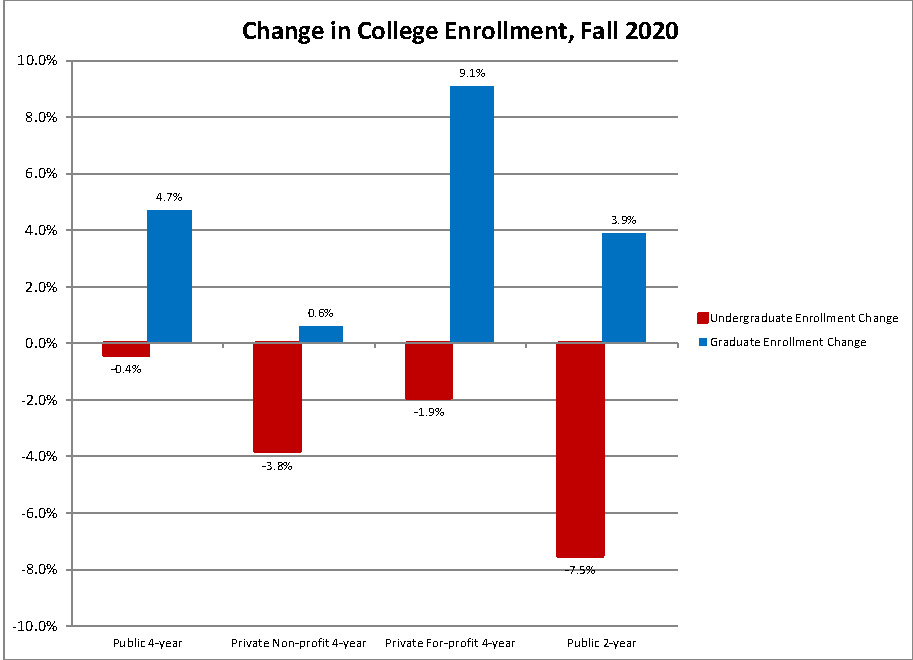Throughout the U.S. colleges and universities have become hot spots for new COVID-19 infections, often with numbers that are astronomical for the small towns in which the schools are located. After one month, however, returning to school has been less of a problem for the economy than was feared. This doesn’t mean we’re out of the woods, of course, but the outbreaks have so far been mostly confined to the campuses, rather than setting off big spikes in the college towns. Obviously, stay in touch with this issue as flu season begins.
This morning brought a report from the National Student Clearinghouse that was more good news for the higher ed market. The National Student Clearinghouse Research Center released a preliminary report on fall enrollment across the U.S. today and its results were better than expected. Colleges and universities have seen undergraduate enrollment decline 2.5% in fall compared to last year. Public 4-year schools were nearly even with 2019, and private non-profit schools were off 3.8%. One downside surprise was that community colleges saw a 7.5% decline. Community colleges were expected to get a bump because of the economic impact of the pandemic. Another troubling trend was the decline in foreign students. The pandemic, and its related travel restrictions, accelerated the declining foreign student enrollment to 11% in fall 2020. Only 22% of the colleges and universities reported in time for this update, so it is possible that these trends will see revisions by the time of the final report in late fall.

Pennsylvania institutions fared much worse than the nation as a whole, probably because of the predominance of private 4-year schools, with enrollments shrinking 9.2%. One national trend that is likely to hit Pittsburgh universities harder than most is the 11% drop in foreign students enrolled in U.S. colleges. Locally, Duquesne University was off very slightly, as an increase in graduate students virtually offset the drop in undergrad enrollment. The same trend boosted enrollment slightly higher at Slippery Rock and California University of PA. Local private colleges Point Park University and Grove City College both report that enrollment was lower but in line with 2019. Robert Morris University saw a decline of just under 10% but attributed that to an unusually large graduating class in 2019 and a significant drop in international students. Data on Pitt and CMU enrollments wasn’t available but, assuming enrollment declines were milder than expected there also, news is good for the many planned construction projects in Oakland.
In project news, JMC Holdings selected the PJ Dick/Dick Building Co. team as construction manager for the 1501 Penn Avenue office building, which is expected to advance in spite of rejection by the Pittsburgh Planning Commission. Another large redevelopment will be before the Zoning Board of Adjustment in October. Echo Realty’s Shady Hill mixed-use project, a demolition and redevelopment of the Shakespeare Street Giant Eagle in Shadyside, involves a new 36,000 square foot Giant Eagle and 38,000 square feet of retail, to be built by Continental Building Co., and a $10 million, 432-car garage that has been awarded to Carl Walker Construction. Shady Hill also includes a $37 million, 252-unit apartment being developed by Echo’s partner Greystar. Massaro Corp. is the contractor for the apartments.
Mele & Mele was low on the $25.7 million Canonsburg-Houston WWTP. Yarborough was low bidder on the $1.9 million Port Authority Manchester Garage engine test facility. Masco Construction was low on the $3.6 million Robinson Township Police Station. Sentinel Construction is about to start on an $8.7 million renovation of Seven Oaks Country Club in Beaver. Johnson Development has awarded a contract to Franjo Construction for the new $6 million, 105,000 square foot Cube Smart Self-Storage on the North Side. Franjo is also the contractor for a $3.2 million upgrade to Zamagias’ Shaler Plaza.The $67 million Canon McMillan Middle School is out to bid due Oct. 15.
